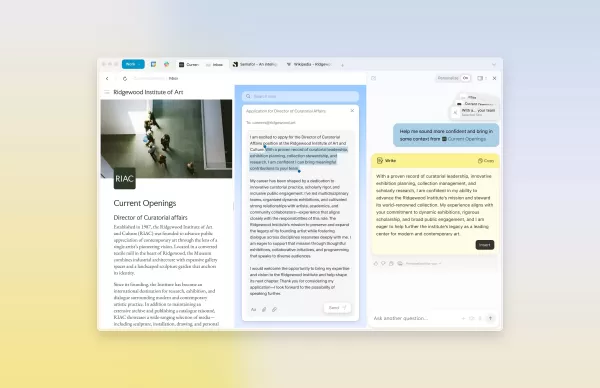AI Transforms Education: How Artificial Intelligence Enhances Student Learning
The education sector is undergoing a profound transformation as artificial intelligence becomes increasingly integrated into learning environments. AI technologies are revolutionizing teaching methodologies, personalizing student experiences, and streamlining institutional operations. This comprehensive exploration examines AI's multifaceted role in education - from adaptive learning platforms to global classroom connections - while analyzing its benefits, implementation challenges, and ethical considerations shaping 21st century learning.
Key Highlights
Tailored Learning Pathways: AI algorithms create customized educational experiences matching each student's unique abilities and learning patterns.
Round-the-Clock Academic Support: Intelligent tutoring systems offer personalized assistance with coursework and complex concepts anytime.
Borderless Learning Communities: AI facilitates international student collaborations, breaking down geographical barriers to education.
Interactive Educational Tools: Gamified learning applications powered by AI dramatically increase student motivation and retention.
Inclusive Education Solutions: AI-powered accessibility tools provide equitable learning opportunities for students with diverse needs.
Actionable Learning Analytics: Advanced data analysis gives educators deep insights into student progress and potential intervention points.
Ethical Implementation Framework: Responsible AI integration requires careful attention to data privacy and algorithmic fairness.
Continuous System Enhancement: Successful AI adoption demands ongoing evaluation and improvement to maximize educational impact.
The Educational Revolution Powered by AI
Understanding AI's Role in Modern Education
Artificial intelligence in education represents the strategic application of machine learning and cognitive computing technologies to enhance teaching effectiveness and learning outcomes. These intelligent systems go beyond simple automation - they create dynamic, responsive educational ecosystems capable of personalizing instruction at scale while supporting educators in their vital work.

At its core, AI in education shifts the paradigm from standardized teaching to customized learning experiences. Traditional classroom models often struggle to accommodate varying student needs, whereas AI-driven systems can continuously adapt content delivery, pacing, and instructional methods based on real-time performance data.
Beyond academic personalization, AI brings transformative efficiency to administrative processes:
- Smart Grading Systems: Automated assessment tools provide consistent evaluation while freeing instructors for higher-value interactions.
- Predictive Performance Analysis: Machine learning identifies at-risk students early, enabling timely support interventions.
- Resource Optimization: AI helps institutions allocate teaching resources more effectively based on demonstrated needs.
- Curriculum Enhancement: Data-driven insights inform continuous improvement of educational content and delivery methods.
This technological integration fosters a synergistic relationship between educators and intelligent systems, where human expertise guides AI implementation while AI augments teaching capabilities. The result is an enhanced educational environment where:
- Teachers gain powerful tools to multiply their impact
- Students receive individualized attention at scale
- Institutions operate more efficiently
- Learning becomes more engaging and effective
Customized Learning Through Intelligent Systems
Adapting to Diverse Learning Needs
AI-powered education platforms excel at delivering personalized learning experiences by continuously analyzing student interactions and performance data. These systems identify individual knowledge gaps, preferred learning modalities, and optimal challenge levels to construct custom learning pathways that maximize engagement and comprehension.
Key personalization capabilities include:
- Content Adaptation: Dynamically adjusting lesson difficulty and presentation style based on demonstrated understanding
- Multimodal Delivery: Offering material through various formats (visual, auditory, interactive) matched to learning preferences
- Progress-Based Pacing: Allowing students to advance upon mastery while providing reinforcement when needed
- Interest-Based Recommendations: Suggesting supplementary materials aligned with individual academic interests
The foundation of effective personalization lies in robust data ecosystems that gather insights from multiple touchpoints:
Data Source Insights Generated Personalization Application Assessment Results Knowledge mastery levels Customized lesson sequencing Interaction Patterns Preferred learning modalities Optimized content delivery Engagement Metrics Motivation indicators Adaptive challenge balancing
This data-driven approach creates learning experiences that are both highly individualized and scalable, addressing one of education's most persistent challenges - delivering personalized instruction in resource-constrained environments.
Intelligent Tutoring: Always-Available Academic Support
AI-powered tutoring systems represent a significant advancement in educational support, providing students with personalized guidance that adapts in real-time to their evolving understanding. These intelligent tutors combine natural language processing with sophisticated knowledge modeling to simulate human tutoring interactions while offering unprecedented availability.
Key advantages of AI tutoring systems include:
- Continuous Availability: 24/7 access eliminates temporal barriers to academic support
- Instant Feedback: Immediate clarification of concepts accelerates the learning process
- Adaptive Questioning: Dynamically adjusts problem difficulty based on performance
- Multilingual Support: Breaks down language barriers in learning assistance
Notable implementations include:
- Language Learning Platforms: Systems like Duolingo use AI to personalize vocabulary acquisition and grammar practice
- STEM Tutoring: Specialized tutors provide step-by-step guidance for complex math and science problems
- Writing Assistants: AI coaches offer real-time feedback on composition structure and style

These systems excel at delivering:
- Personalized Knowledge Reinforcement
- Confidence-Building Through Successive Approximation
- Identification of Persistent Misconceptions
- Progress Tracking Across Learning Journeys
As these technologies evolve, they integrate increasingly sophisticated capabilities like emotional recognition and cultural adaptation, making digital tutoring more nuanced and effective. However, their greatest value emerges when complementing (rather than replacing) human instruction - creating blended learning environments where technology handles routine reinforcement while educators focus on higher-order cognitive development.
Evaluating AI's Educational Impact
Advantages and Implementation Challenges
Benefits Considerations - Customized learning experiences
- Democratized access to quality education
- Enhanced student engagement metrics
- Data-driven instructional improvement
- Reduced administrative burdens
- Data security protocols
- Algorithmic transparency requirements
- Digital infrastructure investments
- Educator training programs
- Balancing tech/human instruction
Frequently Asked Questions
How does AI create personalized learning experiences?
AI systems analyze multiple data points including assessment results, interaction patterns, and engagement levels to build comprehensive learner profiles. These profiles inform real-time adjustments to content delivery, pacing, and instructional methods that optimize comprehension and retention for each student.
What role does AI play in global education initiatives?
AI facilitates cross-border learning collaborations through real-time language translation, virtual exchange platforms, and shared digital learning environments. These tools enable students worldwide to jointly solve problems, conduct research, and gain multicultural perspectives previously limited by geographical constraints.
How are educational institutions addressing AI implementation challenges?
Progressive institutions are developing comprehensive AI integration frameworks that prioritize:
- Robust data governance policies
- Algorithmic bias detection protocols
- Professional development programs for educators
- Hybrid learning models balancing technology and human instruction
- Ongoing impact evaluation methodologies
Related article
 Dia Unveils Skill Gallery as Perplexity Expands Comet Tasks
Today's AI-powered browsers haven't yet reached their full potential to handle complex, multi-step workflows autonomously. However, developers are making strides by introducing smart features that streamline repetitive tasks through customizable prom
Dia Unveils Skill Gallery as Perplexity Expands Comet Tasks
Today's AI-powered browsers haven't yet reached their full potential to handle complex, multi-step workflows autonomously. However, developers are making strides by introducing smart features that streamline repetitive tasks through customizable prom
 Google Denies AI Search is Harming the Web's Integrity
Google Defends AI Search Features Amid Traffic ConcernsGoogle maintains its AI-powered search enhancements haven't negatively impacted overall website traffic, despite emerging reports suggesting otherwise. Liz Reid, Head of Google Search, explained
Google Denies AI Search is Harming the Web's Integrity
Google Defends AI Search Features Amid Traffic ConcernsGoogle maintains its AI-powered search enhancements haven't negatively impacted overall website traffic, despite emerging reports suggesting otherwise. Liz Reid, Head of Google Search, explained
 Amazon hits milestone with one million robots deployed, launches new generative AI model
Amazon Reaches Robot Workforce Milestone in WarehousesAfter thirteen years of robotic integration, Amazon has achieved a significant automation breakthrough. The e-commerce giant confirmed it now operates one million robots across its global warehous
Comments (0)
0/200
Amazon hits milestone with one million robots deployed, launches new generative AI model
Amazon Reaches Robot Workforce Milestone in WarehousesAfter thirteen years of robotic integration, Amazon has achieved a significant automation breakthrough. The e-commerce giant confirmed it now operates one million robots across its global warehous
Comments (0)
0/200
The education sector is undergoing a profound transformation as artificial intelligence becomes increasingly integrated into learning environments. AI technologies are revolutionizing teaching methodologies, personalizing student experiences, and streamlining institutional operations. This comprehensive exploration examines AI's multifaceted role in education - from adaptive learning platforms to global classroom connections - while analyzing its benefits, implementation challenges, and ethical considerations shaping 21st century learning.
Key Highlights
Tailored Learning Pathways: AI algorithms create customized educational experiences matching each student's unique abilities and learning patterns.
Round-the-Clock Academic Support: Intelligent tutoring systems offer personalized assistance with coursework and complex concepts anytime.
Borderless Learning Communities: AI facilitates international student collaborations, breaking down geographical barriers to education.
Interactive Educational Tools: Gamified learning applications powered by AI dramatically increase student motivation and retention.
Inclusive Education Solutions: AI-powered accessibility tools provide equitable learning opportunities for students with diverse needs.
Actionable Learning Analytics: Advanced data analysis gives educators deep insights into student progress and potential intervention points.
Ethical Implementation Framework: Responsible AI integration requires careful attention to data privacy and algorithmic fairness.
Continuous System Enhancement: Successful AI adoption demands ongoing evaluation and improvement to maximize educational impact.
The Educational Revolution Powered by AI
Understanding AI's Role in Modern Education
Artificial intelligence in education represents the strategic application of machine learning and cognitive computing technologies to enhance teaching effectiveness and learning outcomes. These intelligent systems go beyond simple automation - they create dynamic, responsive educational ecosystems capable of personalizing instruction at scale while supporting educators in their vital work.

At its core, AI in education shifts the paradigm from standardized teaching to customized learning experiences. Traditional classroom models often struggle to accommodate varying student needs, whereas AI-driven systems can continuously adapt content delivery, pacing, and instructional methods based on real-time performance data.
Beyond academic personalization, AI brings transformative efficiency to administrative processes:
- Smart Grading Systems: Automated assessment tools provide consistent evaluation while freeing instructors for higher-value interactions.
- Predictive Performance Analysis: Machine learning identifies at-risk students early, enabling timely support interventions.
- Resource Optimization: AI helps institutions allocate teaching resources more effectively based on demonstrated needs.
- Curriculum Enhancement: Data-driven insights inform continuous improvement of educational content and delivery methods.
This technological integration fosters a synergistic relationship between educators and intelligent systems, where human expertise guides AI implementation while AI augments teaching capabilities. The result is an enhanced educational environment where:
- Teachers gain powerful tools to multiply their impact
- Students receive individualized attention at scale
- Institutions operate more efficiently
- Learning becomes more engaging and effective
Customized Learning Through Intelligent Systems
Adapting to Diverse Learning Needs
AI-powered education platforms excel at delivering personalized learning experiences by continuously analyzing student interactions and performance data. These systems identify individual knowledge gaps, preferred learning modalities, and optimal challenge levels to construct custom learning pathways that maximize engagement and comprehension.
Key personalization capabilities include:
- Content Adaptation: Dynamically adjusting lesson difficulty and presentation style based on demonstrated understanding
- Multimodal Delivery: Offering material through various formats (visual, auditory, interactive) matched to learning preferences
- Progress-Based Pacing: Allowing students to advance upon mastery while providing reinforcement when needed
- Interest-Based Recommendations: Suggesting supplementary materials aligned with individual academic interests
The foundation of effective personalization lies in robust data ecosystems that gather insights from multiple touchpoints:
| Data Source | Insights Generated | Personalization Application |
|---|---|---|
| Assessment Results | Knowledge mastery levels | Customized lesson sequencing |
| Interaction Patterns | Preferred learning modalities | Optimized content delivery |
| Engagement Metrics | Motivation indicators | Adaptive challenge balancing |
This data-driven approach creates learning experiences that are both highly individualized and scalable, addressing one of education's most persistent challenges - delivering personalized instruction in resource-constrained environments.
Intelligent Tutoring: Always-Available Academic Support
AI-powered tutoring systems represent a significant advancement in educational support, providing students with personalized guidance that adapts in real-time to their evolving understanding. These intelligent tutors combine natural language processing with sophisticated knowledge modeling to simulate human tutoring interactions while offering unprecedented availability.
Key advantages of AI tutoring systems include:
- Continuous Availability: 24/7 access eliminates temporal barriers to academic support
- Instant Feedback: Immediate clarification of concepts accelerates the learning process
- Adaptive Questioning: Dynamically adjusts problem difficulty based on performance
- Multilingual Support: Breaks down language barriers in learning assistance
Notable implementations include:
- Language Learning Platforms: Systems like Duolingo use AI to personalize vocabulary acquisition and grammar practice
- STEM Tutoring: Specialized tutors provide step-by-step guidance for complex math and science problems
- Writing Assistants: AI coaches offer real-time feedback on composition structure and style

These systems excel at delivering:
- Personalized Knowledge Reinforcement
- Confidence-Building Through Successive Approximation
- Identification of Persistent Misconceptions
- Progress Tracking Across Learning Journeys
As these technologies evolve, they integrate increasingly sophisticated capabilities like emotional recognition and cultural adaptation, making digital tutoring more nuanced and effective. However, their greatest value emerges when complementing (rather than replacing) human instruction - creating blended learning environments where technology handles routine reinforcement while educators focus on higher-order cognitive development.
Evaluating AI's Educational Impact
Advantages and Implementation Challenges
| Benefits | Considerations |
|---|---|
|
|
Frequently Asked Questions
How does AI create personalized learning experiences?
AI systems analyze multiple data points including assessment results, interaction patterns, and engagement levels to build comprehensive learner profiles. These profiles inform real-time adjustments to content delivery, pacing, and instructional methods that optimize comprehension and retention for each student.
What role does AI play in global education initiatives?
AI facilitates cross-border learning collaborations through real-time language translation, virtual exchange platforms, and shared digital learning environments. These tools enable students worldwide to jointly solve problems, conduct research, and gain multicultural perspectives previously limited by geographical constraints.
How are educational institutions addressing AI implementation challenges?
Progressive institutions are developing comprehensive AI integration frameworks that prioritize:
- Robust data governance policies
- Algorithmic bias detection protocols
- Professional development programs for educators
- Hybrid learning models balancing technology and human instruction
- Ongoing impact evaluation methodologies
 Dia Unveils Skill Gallery as Perplexity Expands Comet Tasks
Today's AI-powered browsers haven't yet reached their full potential to handle complex, multi-step workflows autonomously. However, developers are making strides by introducing smart features that streamline repetitive tasks through customizable prom
Dia Unveils Skill Gallery as Perplexity Expands Comet Tasks
Today's AI-powered browsers haven't yet reached their full potential to handle complex, multi-step workflows autonomously. However, developers are making strides by introducing smart features that streamline repetitive tasks through customizable prom
 Google Denies AI Search is Harming the Web's Integrity
Google Defends AI Search Features Amid Traffic ConcernsGoogle maintains its AI-powered search enhancements haven't negatively impacted overall website traffic, despite emerging reports suggesting otherwise. Liz Reid, Head of Google Search, explained
Google Denies AI Search is Harming the Web's Integrity
Google Defends AI Search Features Amid Traffic ConcernsGoogle maintains its AI-powered search enhancements haven't negatively impacted overall website traffic, despite emerging reports suggesting otherwise. Liz Reid, Head of Google Search, explained





























